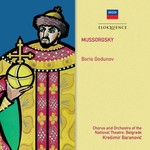
Mussorgsky: Boris Godunov (complete opera recorded in 1955)
 $28.00
Out of Stock
$28.00
Out of Stockadd to cart
MODEST MUSSORGSKY
Mussorgsky: Boris Godunov (complete opera recorded in 1955)
Miroslav Čangalović, Sofija Janković, Zlata Sesardić, Milica Miladinović, Stepan Andrashev / Belgrade National Opera Chorus, Kreshimir Baranovich
[ Decca Australian Eloquence / 2 CD ]
Release Date: Monday 20 August 2018
A first release on CD of Mussorgsky's epic tragedy recorded by the Belgrade National Opera. With this and six companion issues, Eloquence makes available for the first time on CD the seven complete Russian operas recorded in 1955 by Decca with the company of the Belgrade Opera. Fresh from a successful tour of Boris Godunov in Switzerland the previous year, the Belgrade Opera in 1955 was keen to make an impression on an international public. At the same time, the Decca company perceived a cost-effective but artistically assured opportunity to expand both its small but rapidly growing stereo catalogue (launched the previous year with Ansermet and the Orchestre de la Suisse Romande) and its opera discography with classics of the Russian opera repertoire which it had previously not been possible to record in the original language.
In the event, the stereo versions were held back for the US market and only released in Europe in the 1960s, by which time the Belgrade Opera had acquired an international reputation for excellence thanks both to the mono issues and to its extensive touring schedule, which took in all the major European operatic centres. The Boris on their recording was Miroslav Čangalović, who became known as a latterday Chaliapin in the part, among the most renowned exponents of his generation. In a 'house' version of the opera, incorporating portions of the 'Polish' third act in Rimsky-Korsakov's orchestration, Čangalović was joined by other stalwarts of the company such as Melanija Bugarinović, who also won acclaim as Erda at Bayreuth around this time, and Žarko Cvejić as a magnificently sonorous and sinister Varlaam.
The booklet for this newly remastered release prints both a synopsis and an essay giving full historical context to the Belgrade opera recordings.
'The outstanding principal is Miro Brajnik, possessor of a fine, ringing tenor. His is the most compelling Dmitri on records.' High Fidelity, March 1957
'The minor characters are well differentiated and well sung. The chorus is splendid and extremely well recorded. The various planes of sound are brilliantly engineered, creating the illusion of distant pilgrims, passing monks, the immediacy of a big crowd and especially the great bells' clangour. The Revolutionary scene is magnificent choral recording and here Baranović is splendidly vigorous.' Opera, October 1958